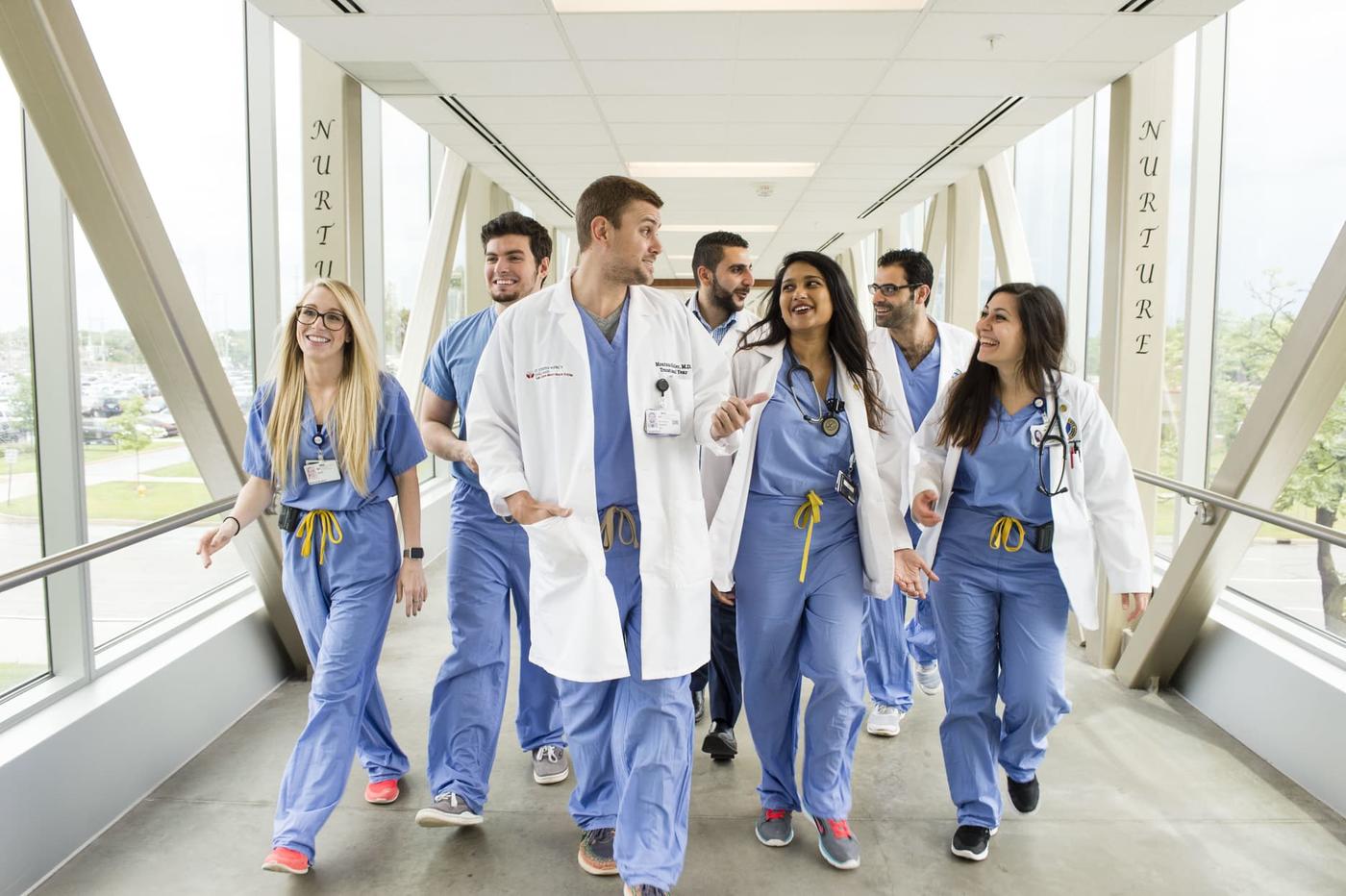With more than 160 medical specialties and subspecialties out there, choosing the right one can be a daunting task. This guide will walk you through some common specialties to help you decide which medical profession might suit you best.
Internist
If you’re a big-picture person who wants to be in a medical field where relationships with patients is a key part of your job, internal medicine may be the right path for you.
What Does an Internist Do?
An internist—also called an internal medicine physician or general internist—is a doctor of internal medicine for adults. An internist specializes in the internal organs and must know how all the body systems work together. In addition, internists focus on preventive care and treat minor ailments such as ear infections, as well as chronic illnesses such as Type 2 diabetes and heart disease.
Internists often work in hospitals or private practice, but they also work at rehabilitation, hospice, and research facilities.
Traits Internists Tend to Have
Sometimes called the “doctor’s doctor,” internists are called on to be both active listeners and problem-solvers, asking questions and connecting the dots to identify medical issues.
Key Qualifications of an Internist
Internal medicine requires a three-year residency, but many physicians use internal medicine as a foundation from which to pursue further training in a variety of subspecialties.
Family Medicine Doctor
If you like the whole-system approach of general internal medicine but want to work with patients of all ages, family medicine could be the right choice for you.
What Does a Family Medicine Doctor Do?
Family medicine doctors treat patients of all ages and work with all body systems. They train in pediatrics, obstetrics and gynecology, internal medicine, psychiatry and neurology, surgery, and community medicine. They may also perform some minor in-office procedures.
Family medicine doctors typically work in outpatient settings and provide the majority of care for underserved rural and urban United States populations.
Traits Family Medicine Doctors Tend to Have
For family doctors, understanding community-level factors and social determinants of health is often a critical part of the job.
Key Qualifications of a Family Medicine Doctor
Family physicians typically work in an outpatient setting, often in private practice. As with internal medicine, family medicine requires a three-year residency. Additional training is needed for such subspecialties as adolescent, geriatric, or pain medicine.
Pediatrician
Does general internal medicine interest you, but you want to work with kids instead of adults? If so, pediatrics is likely your calling.
What Does a Pediatrician Do?
A pediatrician is a doctor who cares for patients from birth through young adulthood. In addition to the responsibilities of an internist, pediatricians must monitor their patients’ growth, behavior, and development, and keep them up to date with recommended childhood immunizations. Pediatricians also advise parents on children’s health, nutrition, safety, and fitness.
Key Qualifications of a Pediatrician
Pediatrics requires a three-year residency, but many pediatricians further their studies to include such subspecialties as adolescent medicine, emergency medicine, pediatric cardiology, or pediatric surgery.
Obstetrician-Gynecologist (OB-GYN)
If you wish to focus on women’s health, consider the field of obstetrics-gynecology. An OB-GYN is a medical doctor who works with female patients from puberty through the middle and later stages of life.
What Does an OB-GYN Do?
An OB-GYN combines two disciplines: obstetrics, which involves the treatment of pregnant women and the delivery of babies, and gynecology, the care of a woman’s reproductive organs and health.
An OB-GYN may be the only doctor many young women see on a regular basis. For this reason, many obstetrician-gynecologists offer a broad range of medical services—even serving as primary care providers.
Key Qualifications of an OB-GYN
An OB-GYN must complete a four-year residency, with additional training for subspecialties.
General Surgeon
Do you have excellent hand-eye coordination, meticulous attention to detail, and a team-player attitude? Can you keep cool under pressure? If so, consider becoming a surgeon.
What Does a General Surgeon Do?
In addition to performing surgery and treating trauma victims and critically ill patients, a surgeon leads doctors, nurses, and technicians during surgery while monitoring the patient’s health. Surgeons also direct the patient’s pre- and post-operative care.
Surgeons work in such environments as hospitals, private practices, and government agencies.
Key Qualifications of a General Surgeon
General surgeons must be capable in nearly all forms of surgery, and they should be able to handle emergencies and unexpected events in the operating room.
A general surgery residency lasts five years. There are numerous surgical subspecialties, each with different training requirements.
Anesthesiologist
Are you extremely detail-oriented but able to react quickly to changing circumstances? Are you able to stay focused in high-pressure situations? If so, the field of anesthesiology may be your match.
What Does an Anesthesiologist Do?
An anesthesiologist specializes in anesthesia care, pain management, and critical care medicine. Anesthesiologists play critical roles during surgery, administering medicine to alleviate pain, and evaluating patients before, during, and after an operation to ensure safety and comfort.
Key Qualifications of an Anesthesiologist
An anesthesiology residency lasts four years, plus additional training for subspecialties.
Cardiologist
If you enjoy the idea of becoming an expert in one focus area, cardiology is one of many fields for you to consider. A cardiologist is a doctor of the cardiovascular system, which includes the heart and blood vessels.
What Does a Cardiologist Do?
Cardiologists diagnose and monitor heart conditions and other cardiovascular issues, such as heart attacks, heart valve disease, arrhythmia, and high blood pressure. In the United States, heart disease is the leading cause of death for men and women, making the role of a cardiologist all the more critical to our healthcare system.
Key Qualifications of a Cardiologist
After a three-year internal medicine residency, cardiologists must complete a three-year fellowship in cardiology. Subspecialties such as heart failure or electrophysiology (EP) require an additional 1-3 years of study.
Pathologist
If you love lab work and solving mysteries, then pathology may be your path.
What Does a Pathologist Do?
A pathologist is a medical doctor who examines blood, tissue, and bodily fluid samples to identify illness, assess its severity, and give treatment advice to doctors and other medical staff.
Some pathologists are doctors with specialized laboratory training, while others are scientists with specialized clinical training.
An anatomic pathologist examines tissues to identify disease or other issues. Clinical pathologists measure the chemical makeup of blood and other body fluids. Forensic pathologists determine a cause of death by examining a corpse.
Pathologists practice in community, university, and government hospitals and clinics; independent laboratories; and private offices.
Key Qualifications of a Pathologist
Doctors of pathology may follow or combine analytic, diagnostic, or forensic pathology residencies that last three to four years. An additional one to two years of training is required for subspecialties.
Getting Started on Your Path to Becoming a Doctor
Now that you know more about some types of medical doctors, you’re on your way to answering the question “What kind of doctor should I be?”
At Ross University School of Medicine (RUSM), your medical education will prepare you for whatever specialty you decide to pursue. Located on the Caribbean island of Barbados, RUSM is committed to providing students with a range of global medical opportunities that will enable them to develop the kinds of life and professional skills that will make them stand out in their residency and beyond. For 2022–2023 RUSM graduates, the first-time residency attainment rate was 98 percent.*
With a network of more than 15,000 alumni, RUSM is one of the largest providers of doctors for the U.S. healthcare system. RUSM graduates are eligible to apply to practice in all 50 states and Puerto Rico. Learn more about the RUSM Doctor of Medicine (MD) program and our residency matches, or contact us for more information.
*First-time residency attainment rate is the percentage of students attaining a 2023–2024 residency position out of all graduates or expected graduates in 2022–2023 who were active applicants in the 2023 NRMP match or who attained a residency position outside the NRMP match.
How Long Is Training After Med School?
Residency training lasts between 3-7 years for most specialties while optional subspecialty fellowships last from 1-3 years and are completed after residency. The length of postgraduate training after medical school depends on your desired specialty and if you choose to pursue a subspecialty.
Residency and Fellowship Examples
- General practitioners of internal, family, or pediatric medicine usually have a three-year residency, while certain surgical specialties, such as neurosurgery, require up to seven years of post-graduate residency training.
- A cardiovascular disease fellowship, an internal medicine subspecialty, typically lasts three years.
- A spinal surgery fellowship, a subspecialty of neurosurgery and orthopedic surgery, often lasts one year.
Related Resources:
Related Blogs




